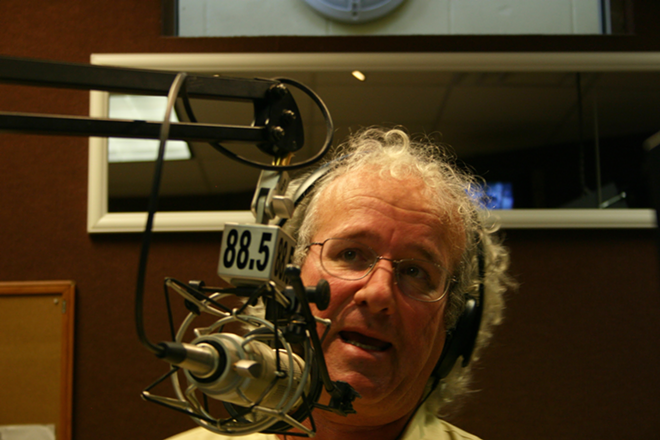
Last Thursday at SeaWorld in Orlando, the crowd gasped as orca whales popped out of the water like frogs leaping out of a hot pan. Onlookers murmured in approval as the prodigious mammals hoisted themselves out of the water tank and slid onto the decks, and they cheered when the whales waved to the audience, reacting to hand signals from the trainers.
As some in the audience were aware, this was the same tank where, on February 24, an orca named Tilikum dragged trainer Dawn Brancheau to her death underwater in front of horrified spectators. The incident made international news and brought with it condemnation and threats of legal action from groups like People for the Ethical Treatment of Animals, which has long criticized the use of captive whales in marine shows as unnatural and dangerous both to whales and humans.
But attendance at the park (which shut down Believe: The Spectacular Shamu Show for three days following Brancheau’s death) doesn’t seem to have suffered. Park attendees may have heard about the incident and the subsequent changes in the show — Tilikum is no longer active — but audiences still pour in for the main attraction: big underwater mammals.
Even if onlookers harbor concerns about the animals’ welfare, they still can’t resist the chance to see them up close. After the 11 a.m. performance, London resident Edward Jones said he understood the activists’ objections, but complained that the show “wasn’t as good as last time,” saying he saw “much bigger whales” two years earlier.
Therein lies the challenge for activists who criticize the use of animals in zoos, theme parks and circuses. In a poll conducted by Parade last month asking Americans what they would do if they had $100,000 to give to charity, animal welfare placed fourth, ahead of education, religious donations, the environment and human rights.
But many see a difference between outright animal brutality, such as running cockfights and dog-fighting rings, which are considered crimes, and the practice of keeping animals in captivity for educational or entertainment purposes. And that difference separates the mainstream from the radical in the fight for animal rights.
SeaWorld is owned by the Blackstone group (which also owns Tampa’s Busch Gardens). In 2009 the conglomerate ignored requests from PETA to close SeaWorld in Orlando and send whales to other environs.
Two days after the Tilikum incident, PETA Executive Director Ingrid Newkirk wrote on her blog, “If the only thing that SeaWorld understands is money — and it has made millions off the backs of orcas like Tilly — then one hopes that if public protestation doesn’t do the trick in shutting it down, the lawsuits that are sure to arise will.”
PETA has been on the forefront of a number of cases accusing corporations of animal abuse over the years, and has had some successes on that front (though its in-your-face activism has at times seemed to turn off as many people as it inspired). There’s already at least one “public protestation” on tap at SeaWorld: In late April, a nascent Clearwater activist group called Team Blue Florida plans to demonstrate there.
Organizer Tom Mason says such entertainments have gone as far as they can go. “I think it’s just cruel at this point,” he says. “If there wasn’t any money in it, they probably wouldn’t keep doing it.”
Animal rights activists, PETA included, have traditionally come down to Florida in January when the circus makes it way to the Tampa-St. Petersburg area. But do their protests make a difference? The movement experienced a setback recently when a judge threw out a suit by the Humane Society of the United States to stop alleged mistreatment of Asian elephants at Ringling Brothers circus, ruling that the group lacked standing to pursue its claims. Ringling is now taking the offensive, countersuing the Humane Society on a RICO claim.
Duncan Strauss is the host of WMNF’s bi-weekly Talking Animals, a program that aims to connect pets and people. Though not exclusively about animal rights, the show has hosted such well-known animal advocates as Chrissie Hynde and PETA’s Newkirk and is still the only broadcast forum in local media that focuses on animals (This weekend Strauss is hosting the first Talking Animals Festival in Lowry Park.
Strauss says he’s been involved in protests over the years, and although he respects groups like PETA, he believes change in consciousness about animal abuse at the circus will come incrementally.
“I’ve been in protests where, if you’re not too aggressive, if you gently explain what’s going on with how those animals are treated, I’ve seen people turn on their heels, and leave, saying, ‘I can’t participate in this.’”
David Walls, professor emeritus of sociology at Sonoma State University in Northern California, studies activist movements. He says the questions for institutions like SeaWorld should be, “Are the animals being forced, are they brutalized? In some artificial way are they doing something that is unnatural for them? Should anything like that can be considered imprisonment?” Walls says that the majority of people don’t feel that way, at least not yet.
He says the central question that arises in these types of discussions are: “What side of the line do zoos and circuses and marine performances fall on? Is that humane or it is not? I think that’s the more potent argument.” He says that the majority of Americans aren’t turned off to those events yet, but the opposition could be a slowly growing minority.
Another question that has been raised about Sea World is whether its shows are primarily for education or for entertainment. In order to get permits from NOAA’s National Marine Fisheries Service to import whales or dolphins for public shows, mammal theme parks like SeaWorld must prove they have an education and research program.
But Ed Keith, a marine mammalogy expert at Nova Southeastern University, believes that at best only about 25 percent of orca activities in parks are related to education, with the other 75 percent purely going for entertainment purposes.
He says that the least SeaWorld can do is provide more insight for their paying customers. “The thing that bugs me is going into the stores and they’re all kids’ books,” he says. “There’s an incredible number of adult-level marine mammal books published in the last decade.” But Keith (the author of the 2001 text Survey of Marine Mammals) says SeaWorld officials tell him the books are too expensive and don’t sell. “I say put them there anyway, you’re making enough money… That’s the cost of having a permit.”
He sees the Tilikum attack as the inevitable consequence of the animal’s confined state. “We’ve proved in the past few years that putting people in solitary confinement makes them crazy. How can we expect anything different from marine animals?”
CL attempted to contact SeaWorld management for comments, and per the request of its communications office submitted a list of questions via email last week. Despite several follow-up calls, we had received no answers by press time.
Public sentiment against outright animal abuse has grown stronger in recent years. Law enforcement over the past decade has taken such cruelty more seriously than ever before. The Animal Defense Fund reports that in 1993, just seven states had felony animal cruelty laws, but today 47 do. Currently the group has a petition on its Web site calling for citizens to petition their state legislatures to require animal abusers to register in their communities.
And the celebrated case of NFL Quarterback Michael Vick brought the attention of dog-fighting to the American public in a way they had never experienced. But WMNF’s Duncan Strauss said that case showed the wide range of opinions in the animal rights community, a division that still exists today.
“Even now there’s still very divided camps in the animal welfare world on what should have happened.” While groups like PETA believed that the dogs found at Vick’s Bad Newz Kennels should be euthanized, the group Best Friends ended up rehabilitating about half of the pit bulls rescued from his estate.
But it requires a huge leap in consciousness for most observers to see any link between Michael Vick’s cruelties and the practices of zoos and circuses.
Carole Baskin, the CEO of Big Cat Rescue in Tampa, believes perceptions change when the public sees with their own eyes how unnatural it is to keep wild animals in captivity.
Big Cat Rescue takes in lions, tigers and other big cats that in some cases have been retired from zoos or circuses. She says, “It’s not natural when you think a tiger requires 400 square miles of territory and they’re kept in cages.”
Still, the rarities on display at a park like SeaWorld can trump any such considerations. Visiting the park from Puerto Rico last Thursday, Joaquin Luciano acknowledged the concerns about animals being kept in unnatural circumstances. But, looking over at his young son Tiego, he added, “I don’t think he has a chance to see this anywhere else.”















